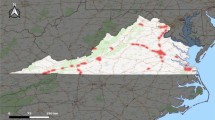Abstract
Travel time is one of the most appropriate traffic measures that can be provided to road users for easy understanding and decision making. This paper presents a simple method to predict travel time on urban arterial roads. Travel time prediction methods include historical methods, model based methods, and data driven approaches. Of these, data driven approaches capture the uncertainty and non-linearity of traffic time series better and hence could be used for travel time prediction under Indian traffic conditions effectively. Among data driven approaches, support vector regression (SVR) models predict travel times with reasonable accuracy, especially when the amount of data is less or the variability in the data is high. However, studies on the use of SVR for travel time prediction under Indian traffic conditions are limited. In this paper, SVR technique was used to predict the travel time using data collected from Bluetooth sensors placed at specific locations on an urban arterial corridor in Chennai, India. The optimum number of inputs, appropriate kernel function, cost parameter and width of tolerance for the SVR model were determined. The results obtained show that the SVR performed better than an Artificial Neural Network model and moving average approach.







Similar content being viewed by others
References
Dharia A, Adeli H (2003) Neural network model for rapid forecasting of freeway link travel time. Eng Appl Artif Intell 16(7):607–613
Hastie T, Tibshirani R, Friedman J (2009) The elements of statistical learning. Springer, New York
IIT M (2014) Traffic data collection and analysis for the research study on Advanced Traveller Information System (ATIS) for Indian cities. Tech. rep. https://coeut.iitm.ac.in/Final%20Report%20R01.pdf
Li R, Rose G (2011) Incorporating uncertainty into short-term travel time predictions. Transp Res Part C Emerg Technol 19(6):1006–1018
Liang Z, Ling-Xiang Z (2006) Link travel time estimation model fusing data from mobile and stationary detector based on BP neural network. In: Communications, Circuits and Systems Proceedings, International Conference on, vol 3. IEEE, pp 2146–2149
Mori U, Mendiburu A, Alvarez M, Lozano JA (2015) A review of travel time estimation and forecasting for advanced traveller information systems. Transp A Transp Sci 11(2):119–157
Nikovski D, Nishiuma N, Goto Y, Kumazawa H (2005) Univariate short-term prediction of road travel times. In: Intelligent Transportation Systems. Proceedings. IEEE, pp 1074–1079, 13 Sep 2005
Park D, Rilett LR (1999) Forecasting freeway link travel times with a multilayer feedforward neural network. Comput Aided Civil Infrastruct Eng 14(5):357–367
Qiao W, Haghani A, Shao CF, Liu J (2016) Freeway path travel time prediction based on heterogeneous traffic data through nonparametric model. J Intell Transp Syst 20(5):438–448
Ramezani M, Geroliminis N (2012) On the estimation of arterial route travel time distribution with markov chains. Transp Res Part B Methodol 46(10):1576–1590
Reddy KK, Kumar BA, Vanajakshi L (2016) Bus travel time prediction under high variability conditions. Curr Sci 111(4):700
Rice J, Van Zwet E (2004) A simple and effective method for predicting travel times on freeways. IEEE Trans Intell Transp Syst 5(3):200–207
Theja P, Vanajakshi L (2010) Short term prediction of traffic parameters using support vector machines technique. In: Emerging Trends in Engineering and Technology (ICETET), 3rd International Conference on 2010 November 19. IEEE, pp 70–75
Van Lint J (2006) Reliable real-time framework for short-term freeway travel time prediction. J Transp Eng 132(12):921–932
Vanajakshi L, Rilett LR (2007) Support vector machine technique for the short term prediction of travel time. In: Intelligent Vehicles Symposium. IEEE, pp 600–605, 13 June 2007
Wu CH, Ho JM, Lee DT (2004) Travel-time prediction with support vector regression. IEEE Trans Intell Transp Syst 5(4):276–281
Yeon J, Elefteriadou L, Lawphongpanich S (2008) Travel time estimation on a freeway using discrete time markov chains. Transp Res Part B Methodol 42(4):325–338
Zeng X, Zhang Y (2013) Development of recurrent neural network considering temporal-spatial input dynamics for freeway travel time modeling. Comput Aided Civil Infrastruct Eng 28(5):359–371
Zhang X, Rice JA (2003) Short-term travel time prediction. Transp Res Part C Emerg Technol 11(3):187–210
Zheng F, Van Zuylen H (2013) Urban link travel time estimation based on sparse probe vehicle data. Transp Res Part C Emerg Technol 31:145–157
Acknowledgements
The authors acknowledge the opportunity provided by the 4th Conference of the Transportation Research Group of India (4th CTRG) held at IIT Bombay, Mumbai, India between 17th December, 2017 and 20th December, 2017 to present the work that forms the basis of this manuscript. The authors also acknowledge the support for this study as a part of the project RB/16-17/CIE/001/TATC/LELI under the Development of a Dynamic Traffic Congestion Prediction System for Indian Cities, funded by Tata Consultancy Services.
Author information
Authors and Affiliations
Corresponding author
Rights and permissions
About this article
Cite this article
Philip, A.M., Ramadurai, G. & Vanajakshi, L. Urban Arterial Travel Time Prediction Using Support Vector Regression. Transp. in Dev. Econ. 4, 7 (2018). https://doi.org/10.1007/s40890-018-0060-6
Received:
Accepted:
Published:
DOI: https://doi.org/10.1007/s40890-018-0060-6




